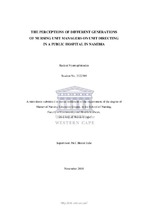| dc.description.abstract | Nursing unit managers from different generations of nurses are expected to manage their units effectively, in order to achieve the healthcare goals for their clients. Directing a unit can be affected by the generational differences among nursing unit managers. It has been stated that generational differences are associated with different perceptions on directing a nursing unit. However, in Namibia, no similar evidence exists to support this theory; therefore, a contextual understanding of the nursing unit managers’ perceptions was necessary to inform future measures of improving the management of a nursing unit.
Aim:
The purpose of this study was to understand and explore the perceptions of nursing unit managers, from different generation cohorts, on directing a unit.
Methods:
An exploratory - descriptive qualitative research approach was employed. The data were collected from ten participants, using semi-structured interviews. The data analysis was done through thematic content analysis.
Results
The nursing unit managers had positive perceptions about their role of directing a nursing unit. The managers’ perceptions of communication, motivation, coaching, and leadership were similar. The differences in the managers’ perceptions were not directly related to generational differences between the nursing unit managers. In general, the nursing unit managers valued communication, and considered it the most significant skill required in directing a nursing unit.
Discussion:
Nursing unit managers from different generation cohorts view their role of directing a unit positively, and share similar perceptions, regardless of the differences in their generations. The little differences noted were not directly related to the nursing unit managers’ generations. Therefore, nursing unit managers need to be well skilled in communication, motivation, coaching, and leadership, to manage a nursing unit/ward. | en_US |

